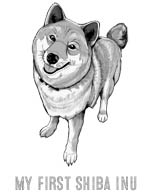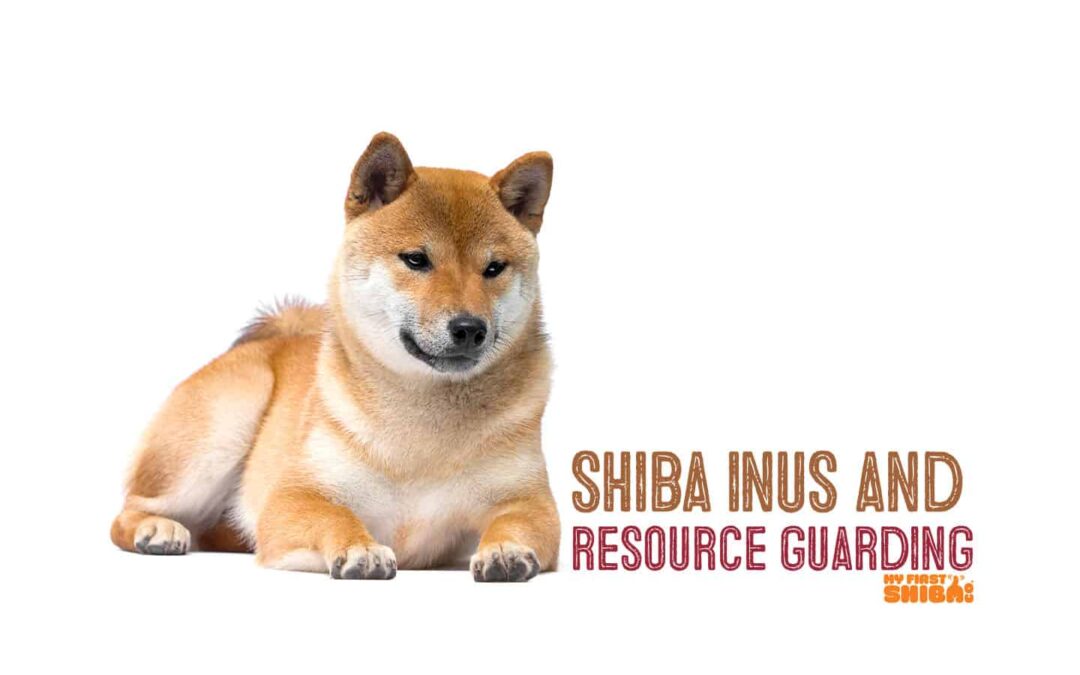On occasion, our posts contain affiliate links. However, we only recommend products that we truly believe in. For more information, visit my privacy policy page.
Rain Jordan, CBCC-KA, CPDT-KA, KPA CTP, Fearful Dogs Expert
www.ExpertCanine.com | www.FearfulDogsProject.org
The term “aggression” sometimes inspires fear and misunderstanding in humans.
While it is understandable to want to avoid being bitten, it's also important to understand variations of aggressive behavior, why they occur, and how to avoid their development.
Prevention is everything.
We can increase our chances of preventing behavior problems by avoiding situations that the animal finds threatening or discomforting.
If you've already missed the prevention window, it's not too late to take steps towards treatment that helps both you and your Shiba feel better and be safer.

What is Resource Guarding?
What's treated as a “resource” can vary from animal to animal.
Every animal is an individual.
And, while animal professionals from different fields may use different terms and definitions from their counterparts when discussing behavior issues, rather than focus on whose definition is most ‘right,’ it's helpful to remember that it's the behavior, not semantic constructs, that we are seeking to avoid, analyze, or modify.
Therefore, whether it is a fear-based behavior (self-defense response to a threat) or a challenge-behavior (aggression aimed toward eliminating competition), it's not the term or definition but the current cause of, and the best solution to, the behavior we seek to avoid or change that are most important.
Food is only one of many possible resources that a dog might guard.
Some dogs will guard their own toys.
Some will guard their beds, or a piece of your household furniture that the dog also uses.
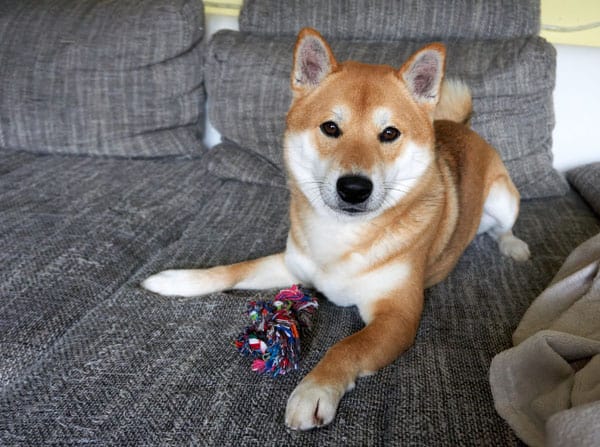
Food, toys, and resting places are among the most commonly guarded items, but depending on the individual’s learning history, health, and other factors including context, a dog may develop resource guarding behavior of more baffling things, such as an empty bowl previously used for food or water.
Seeing their humans and/or other animals in the home as resources—whether of attention, warmth, treats, play, etc.—some dogs may resource guard the owner or another pet.
We might see a dog whose resource guarding extends to the treat bag a trainer is wearing.
Occasionally an individual dog’s resource guarding might include things like his own vomit.
Whatever the resource, the principle is the same: The dog’s behavior functions to keep control of his valuables.
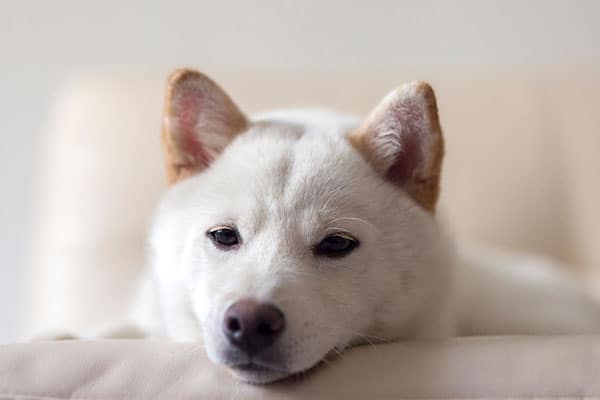
What Causes Resource Guarding?
You'll be happy to know that being a Shiba Inu is not the cause of resource guarding.
Aggressive behavior, including guarding, is almost always a response to the environment, and is often related to the individual’s learning history, but is not mainly a result of breed.
An illness, such as a brain tumor, or pain condition, such as an injury, infection, infestation, or even matted fur, might underlie a change in behavior too.
Dogs who are sick or in pain often will behave differently, so if your dog suddenly begins showing aggressive behavior that seems without reason, get a thorough veterinary exam to rule out medical causes.
In a general sense, resource guarding is normal for dogs—as well as for humans and other animals!
If you think someone approaching is trying to take a valuable resource from you, you'll take action to maintain that resource.
When you are having dinner in a restaurant and an impatient server wants to take your plate before you’re finished eating, you might put your hand out, or over your plate, to signal that you don’t want it removed.
If the server grabs at it anyway, you might escalate by objecting vocally.
If the server ignores your communication and takes the plate anyway, the next time you eat there, you'll be on the lookout for that server and ready to do what you must to keep control of your meal.
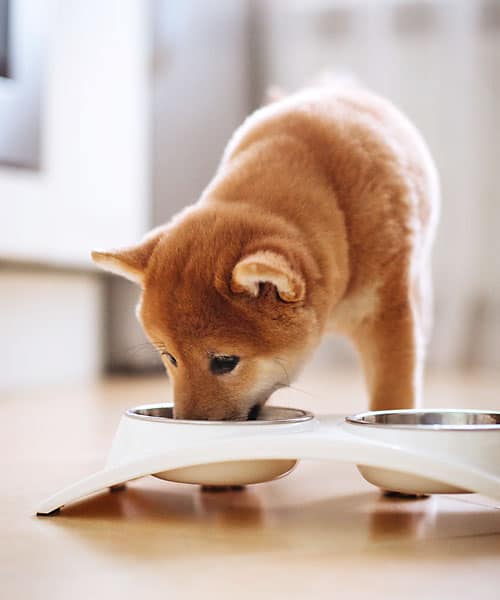
If the pattern were to repeat, you might eventually get frustrated enough to take more drastic action, especially if this is your favorite restaurant, or the only one in town.
When we try to take a dog’s resource, say a bone he is chewing, and he hovers over it to keep us away, we are like that server.
The big difference is that we can avoid the conflict by choosing to go elsewhere.
Our dogs do not enjoy such freedom of choice.
How To Avoid Resource Guarding
Conflicts between dogs and humans are often the result of the differences in control each has.
We, as pet owners, can do pretty much whatever we want, and our pets must tolerate us.
No matter how large or luxurious our homes, our dogs are essentially captives in them; pet dogs cannot unlock the door, walk out, and relocate if they find our behavior intolerable.
Instead, they are forced to try to make the situation tolerable.
If we don’t respect their behavior as expressions of their limited options, conflict—and behavior—can worsen.
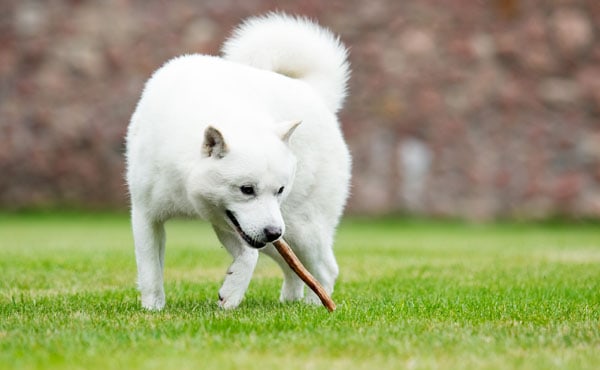
Sometimes, bad advice taken can lead to resource guarding.
For example, there are still people—trainers and non-trainers—who tell dog owners to take their dog’s food bowl away while the dog is eating.
This kind of action doesn't teach your dog that his food is safe, nor that you are the ‘boss’; it teaches your dog that you're a potential thief of his food, a challenger who cannot be trusted.
If you have other pets, and your mealtime set up is such that they can and do access your dog’s food bowl, your dog learns that other animals are also food thieves to be guarded against.
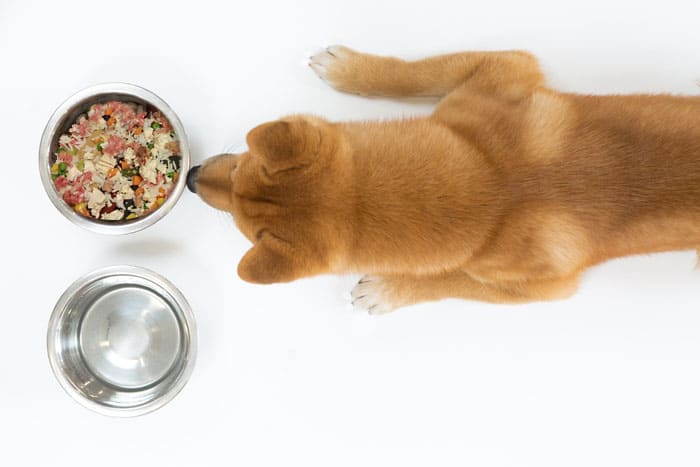
Therefore, the first rule of avoiding resource guarding is this: Avoid situations that might result in your dog’s meals or other valuables being stolen.
Some additional rules to help avoid resource guarding are also versions of methods to modify resource guarding, and they can be applied regardless of what is being guarded.
For example, by pairing something really great—even better than the meal—with the presence of others, classical conditioning / counterconditioning can teach your dog that the presence of others nearby at mealtime is a predictor of even better things.
When someone walks by your dog's valued sofa, if the very next thing that happens is s/he gets a bite of steak, walkers-by can become good news -- predictors of great things -- for your dog. So long as that turns out to be true.
There are important rules such as proper order of operation and safety measures for classical conditioning and behavior modification in general, so do not try it without guidance from a certified, anti-aversives behavior consultant who has expertise in aggression.
Another rule is to teach your dog to trade for an upgrade; he gives you the item, you give him a better item.
Don't just take the item, though. If you start by taking the item away, once again you are his challenger.
Until you've trained other behaviors, you might toss a high value food item a safe distance away from the guarded item so that he leaves the guarded item behind--because he wants to leave it behind in order to get the better one.
Then you can take it -- temporarily.
It's important your dog trusts that when he lets you remove a resource, it is not gone for good— you will give it back. In the beginning stage, you give it back right away.
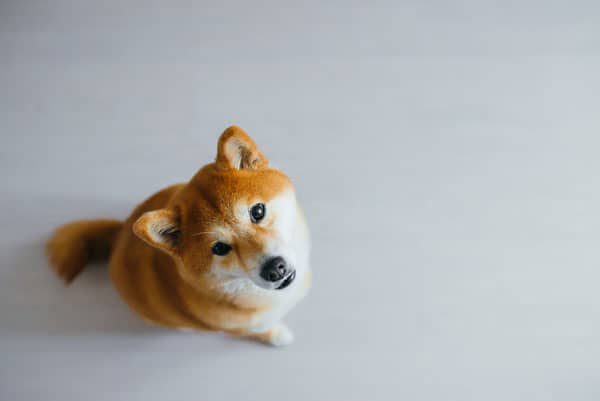
You should also teach your dog foundation behaviors on cue, including “drop it,” “give,” “leave it,” and others appropriate to your situation.
Again, please hire a certified, anti-aversives professional to ensure that what you want your dog to learn is what he actually does learn!
In animal behavior, small errors can become costly over time, so it is best to start with a pro.
What to Do If Your Dog Has Already Begun Resource Guarding
If your dog is already guarding, then you'll want to get that professional help immediately because resource guarding that is not humanely, properly addressed can worsen, and bites can become a serious risk.
Your anti aversives behavior consultant will guide you through careful operant and classical counterconditioning with desensitization to methodically change how your dog responds to various stimuli when resources are present.
She will also recommend additional measures, such as:
- Avoiding situations where guarding can occur, for example by feeding your dog in a separate room with door closed, so he doesn’t have to worry if his food might be taken away, and then when he is no longer near the bowl, removing it so that it doesn’t become another possible item to guard.
- Keeping all valuable resources out of sight, reach, and smell whenever there is a chance your dog might think guarding is the only option. When it's time to let your dog enjoy these resources, provide them separately from others whom your dog might try to guard against.
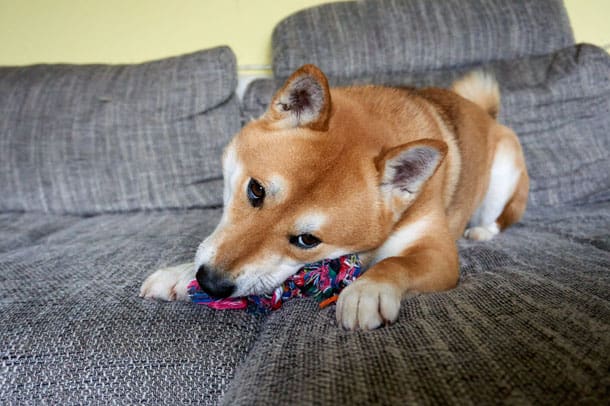
- Rewarding your dog for desired behavior, such as prosocial behavior. Not only can you toss high value treats to your dog while he is enjoying his resource, so that your presence while he has a resource becomes a predictor of more good things for him you might also praise and reward him every time he is friendly rather than "guardy" with someone. Remember that proper safety measures must be in place, such as a secure tie down, or baby gate between your dog and others during behavior modification sessions. Your behavior consultant will design a plan based on the specifics of your situation.
- Avoid corrections and punishments, even the smaller things like scolding, yelling, physically moving the dog or scaring the dog away, because these will create negative associations with you and potentially with whatever or whoever else is present at the time. Negative associations tend to lead to more negative behavior over time. In other words, if you add unpleasant stimuli (what we call “aversives”) to an already challenging situation like resource guarding, they may function to confirm to your dog that he was right to be concerned and thus he might get better at guarding. There is also the risk that guarding might generalize to other items if the original behavior isn’t properly addressed, and/or if aversive experiences occur while a resource is present.
- If your dog poses a bite risk or has already bitten, your behavior consultant will recommend additional appropriate, humane safety measures, such as basket muzzle training. When basket muzzle training is done slowly and methodically, a dog can be comfortable—even happy—wearing one. The basket muzzle must be comfortable, well-ventilated, and allow the dog’s mouth to open so that he can still eat, drink, and pant.
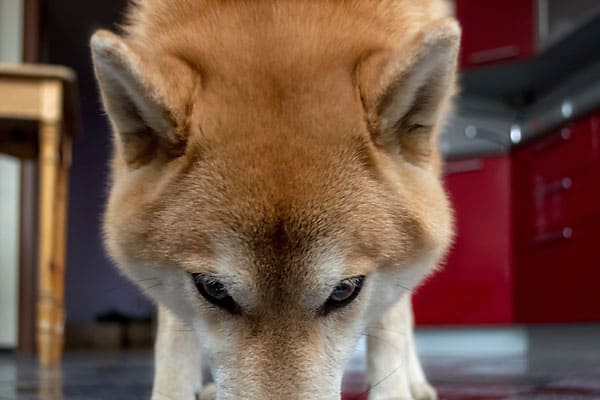
Are Shiba Inus More Prone to Resource Guarding than Other Breeds?
The Shiba Inu is part of a category of dogs I like to think of as Free Spirit dogs, or ‘first step’ dogs, as this group of breeds represents the first evolutionary step from wolf to dog.
The category is commonly referred to as the “basal” breed group.
As part of the first group of dogs, these breeds tend to have less domestic behavior tendencies than breeds of later categories.
They were spared from much of the artificial selection imposed by humans that other breed categories experienced, and thus breeds from this group tend to retain a strong self preservation instinct.
All dogs and other animals, including humans, have this to some degree, so there’s no particular need for a Shiba Inu owner to panic.
On the other hand, those who do have an individual who resource guards may find solace in knowing that such behavior in a first step dog may be considered adaptive, not a disorder, and hopefully their chosen behavior professional’s understanding of this will result in a patient, reduced-stress behavior modification process for owners.
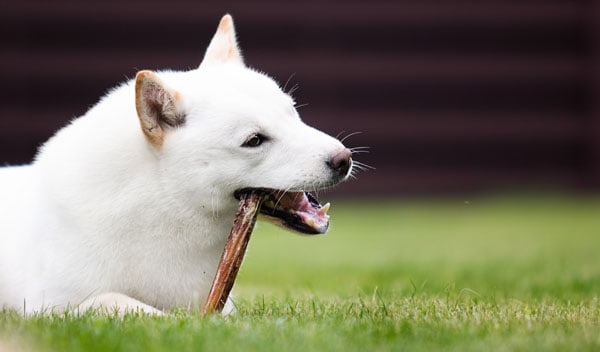
So in short, yes, some individuals may be more prone to resource guarding than breeds from other groups, but as a basic survival mechanism, this should not be assumed a disorder.
Furthermore, tendencies are not the same as predictions. Tendency does not imply absolute nor automatic. As mentioned previously, each dog is an individual and his behaviors will be based on a variety of things outside his ancestry.
Importance of Early Socialization and Anti-Aversives Lifestyle
With any dog, socialization should be completed before 12-14 weeks of age in order to best prepare the pup to develop into a behaviorally sound dog.
Proper socialization does not involve allowing anyone and everyone to approach and handle your puppy as they see fit; that would risk your dog developing fears based on these early experiences.
Exposure to new stimuli should be treated as a desensitization process that never, ever allows the dog to feel uncomfortable or scared.
Proper socialization involves protected, incremental introductions to various visual, tactile, olfactory, and auditory stimuli, following a pace at which the puppy remains comfortable and content.
It should also involve training of foundation behaviors the dog will need to navigate his world.
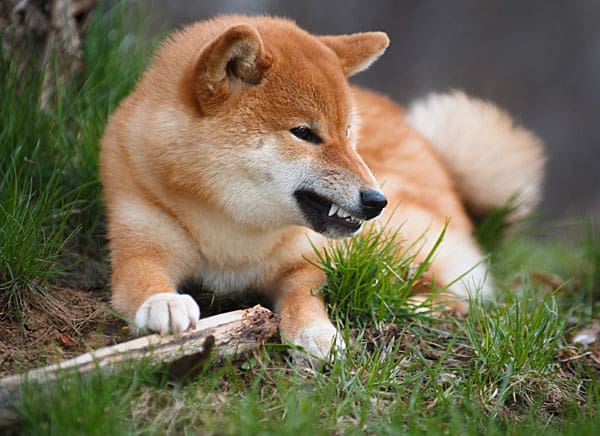
Enlisting a Professional
Any time a pet demonstrates behavior that concerns the owners but is beyond the owners’ abilities to resolve humanely, they should immediately contact a certified behavior professional for private, individualized help.
When considering a behavior consultant or any other animal service provider, look for and prioritize these qualities:
1: Anti-aversives commitment. This is the first priority because a truly anti-aversives professional will recognize and disclose when a case is beyond her qualifications and will direct you to a more suitable option.
AND
2: National certification for canine behavior consultation. Behavior consultants holding the CBCC-KA or CDBC title are certified behavior consultants who have demonstrated breadth and depth of qualifications for this work.
AND
3: Expertise and specialization focused mainly on the type of behavior your dog is experiencing.
AND
4: An honest, seasoned professional who instructs you truthfully in what is needed rather than merely tells you what will gain and keep your business.
Remember to always practice due diligence in confirming the qualifications of your candidate.
--

Rain Jordan is a Certified Behavior Consultant, Canine (CBCC-KA), a Fearful Dogs Expert, a CPDT KA, a Certified Training Partner - Karen Pryor Academy for Animal Training & Behavior, and the author of several books about dogs, rescue, dog behavior, and animal welfare. Learn more at www.ExpertCanine.com and www.FearfulDogsProject.org

Thanks for visiting Myfirstshiba.com! We do our very best in providing our readers with awesome content about our beloved Shiba Inu breed. Some of our articles include reviews and recommendations to our favorite products. We do occasionally earn commissions from certain affiliate links that help support our work and mission. Thanks again for visiting. Shiba Kisses To All!
